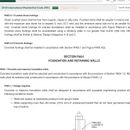Rubble trench foundation in seismic zone D2
Hi all, I’m an owner/builder planning a 2-story house (2600sqft) on Bainbridge Island (seismic D2, wind design 85mph, frost line 12”). We are currently in the early design phase.
As part of our goal of carbon neutrality, we like the idea of a rubble trench foundation to reduce the amount of concrete. When I brought the idea up with the local building inspector, he said getting an engineer stamp will definitely help, otherwise get to know the 2018 IRC prescriptive code really well. But when I looked at the IRC code R403.4.1 for crushed stone footings, it said siesmic A,B, or C only.
So is this off the table? Would it be a waste of time/money to get an engineer stamp? I’m also concerned about wind uplift, since there doesn’t seem to be anything to prevent upward force other than the weight of the grade beam. I’ve read the article Rubble Trench Foundations by Elias Velonis in Fine Homebuilding (https://www.finehomebuilding.com/1984/01/01/rubble-trench-foundations, but there was no mention of seismic or wind issues (however the issue of “treacherous soil” was highlighted). Thanks for all the great help!
Adam
GBA Detail Library
A collection of one thousand construction details organized by climate and house part










Replies
Adam,
If your frost depth is 12", and at most you are looking at maybe 18" from bottom of footings to grade to cover the perimeter drains and provide stability, is there really any savings from just using conventional footings and stem-walls, as opposed to rock and a grade beam?
Fair point, concrete is just so dang useful! I could even use reduced concrete ICF for the perimeter wall (such as Faswall), and be happy with that.
And with the code as it is, my homeowners insurance would probably have something to say. Appreciate the perspective!
Adam
If carbon neutrality is your goal, try to build a house that will last for hundreds of years. A good concrete foundation will go a long ways towards this goal.
You might be able to do a wood foundation (if you're comfortable with that). But you should check with your local code enforcement office before getting too far into the planning process.